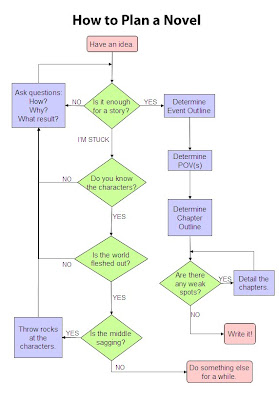Step One: Loose Sketch
 You'll have to click on that image if you want to actually see it. Before I put any color on, I have to make a sketch. This is like my outline. It doesn't have to be very detailed, because all the details are going to change when I do the "real" drawing anyway.
You'll have to click on that image if you want to actually see it. Before I put any color on, I have to make a sketch. This is like my outline. It doesn't have to be very detailed, because all the details are going to change when I do the "real" drawing anyway.It's also totally fun. I'm free, I can make any mistakes I like because they'll all be erased or covered by the colors. It's like a puzzle, too, as I try and figure out where all the pieces need to go so the work as a whole looks right.
Step Two: First Lines and Fill
 This is the first draft. It's not pretty. The shapes and skeleton are there. I hit all the easy scenes, the big parts, and I realize that this story is a lot bigger than I thought it was.
This is the first draft. It's not pretty. The shapes and skeleton are there. I hit all the easy scenes, the big parts, and I realize that this story is a lot bigger than I thought it was.I'm tempted to just say this is good enough. The fun part's over, after all. But it's ugly. And although I have my doubts about being able to fix it, I'll never know if I don't try.
Step Three: Second Layer
 The first revision/edit. This is when I fill in the empty parts from Step Two. This is really hard. The reason I skipped those parts was because I wasn't sure how to draw them, and now that I'm sitting down to do it, I still don't know. But this is what drawing (and writing) is: doing the hard parts so you can learn how to do them.
The first revision/edit. This is when I fill in the empty parts from Step Two. This is really hard. The reason I skipped those parts was because I wasn't sure how to draw them, and now that I'm sitting down to do it, I still don't know. But this is what drawing (and writing) is: doing the hard parts so you can learn how to do them.This is also the point at which I'm pretty sure I was overly ambitious when I decided what I wanted to draw this week.
Step Four: Last Fill and Shading
 A second revision. Now it's starting to look like the final product. Like a real picture. Somewhere between steps three and four I had to disconnect myself from my initial sketch -- from the outline -- and take a look at the picture as a whole. To try and see what the picture really was, rather than what I thought it was going to be.
A second revision. Now it's starting to look like the final product. Like a real picture. Somewhere between steps three and four I had to disconnect myself from my initial sketch -- from the outline -- and take a look at the picture as a whole. To try and see what the picture really was, rather than what I thought it was going to be.At this point, I know was too ambitious, but I also know that there isn't much work left before this picture is as good as I can make it. There's no going back now.
Step Five: Final Touches
 The picture is done, or at least as done as I can make it. I'm not happy with it, necessarily, but I know that at my current skill level this is as good as I can do. I know the picture needs to be fixed, but I don't know how to do it and that's okay. The best thing for me, at this point, is to take what I've learned and move on to another picture. Eventually, I will know what to do.
The picture is done, or at least as done as I can make it. I'm not happy with it, necessarily, but I know that at my current skill level this is as good as I can do. I know the picture needs to be fixed, but I don't know how to do it and that's okay. The best thing for me, at this point, is to take what I've learned and move on to another picture. Eventually, I will know what to do.Here's where the analogy breaks down, of course. With pastels, I can't erase portions and redo them. It's easier to see that moving on is my only option. But with writing (or pencil sketches, I suppose), you can always erase and redo. That's good and bad.
It's good because you can take what you've learned by the end and apply it to the beginning of the novel. It's bad because you can revise the same piece forever and never move on. Sometimes, though, moving on is really the best thing you can do for your work.




